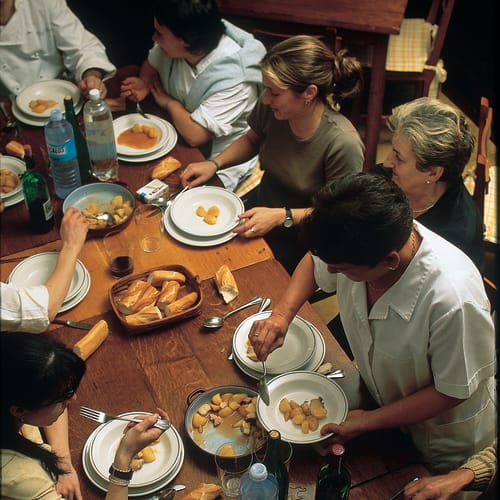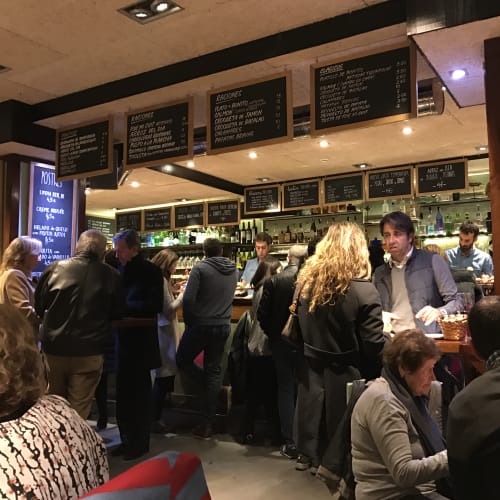Three Kings Sale - Up to 40% Off! Shop Sale
A Generous Spirit
Don Harris | February 2012




I just read an article in the paper this morning that illustrates the deep roots of the Spanish culture, which has enabled them both to endure and to enjoy the turns of life. Their fortitude comes from a deep sense of family and community, which seems to be absorbed into the core of their being.
Just in my lifetime, the Spanish family has experienced a ruinous civil war followed by years of famine. Then they enjoyed a fabulous social rebirth to become the European leader in the arts, sports and cuisine. Yet now Spaniards are facing a severe economic crisis with nearly half of the young Spaniards under 25 without a job. But the feeling in the streets is neither violent nor depressed. There are remnants of indignados standing in Madrid’s Puerta del Sol, who are chatting with passers-by. They are understandably indignant, but they are not antisocial.
Because they are resilient, sustained by their family and their neighbors, Spaniards are prepared to enjoy good fortune as well. I want to share with you a vignette that illustrates the depth of their healthy community feeling -- in good times as well as hard times.
El Gordo is the gigantic national lottery, which consumes much of Spain’s attention during the winter months, as people dream of acquiring an immense, life-changing amount of money. What is unusual about the Spanish lottery however, is that it is designed so that there are several winners, not just one winner-take-all, which is the usual American structure of any kind of a contest. In 2012, El Gordo had 138 winners for the top prize: the identical winning number was printed many times! In addition, it is structured so that if you are low on cash you can buy portions of one ticket -- it becomes sort of a communal ticket, which you share with your neighbors.
It is the custom of the people in this tiny village in the Pyrenees to buy their tickets from a woman who deposits the small profit from the sales in a fund to buy decorations for the town feria. This year the lottery lady canvassed the town as she always does, making sure that everyone had the opportunity to participate. It was a little more of a difficult sell this year because each ticket costs $26 and this year the region was experiencing a severe drought in addition to the national economic crisis.
One older woman really wanted to buy a ticket, as she has customarily done each year, but she was extremely short of cash. She asked the lottery lady to set a ticket aside for her, and promised to bring the money later when she could. On the edge of town lived a Greek filmmaker, who for whatever reason, perhaps he was overlooked, did not participate in the lottery at all.
As you might imagine, the weeks leading up to the drawing were filled with anticipation. The bounty is so huge that people fantasize that all their problems will be solved. The 2012 drawing was almost that true, since an amazing $950 million -- all the first prize tickets -- were rained down in this tiny anonymous village of dirt farmers and unemployed construction workers.
How did it turn out for the lady who was not able to raise enough money to buy the ticket she had reserved? As you might imagine, she felt a little sheepish and actually sent over her young son to see whether the ticket had been reserved for her, despite her inability to pay for it in time. The neighbor-lady in charge of the lottery welcomed the little boy and said, "Of course your mother has her share of the lottery. I saved the ticket for her anyway."
The man on the edge of the town who did not get to purchase a ticket took the turn of events philosophically. He said that a neighbor called him up right after the news came out over the television and offered him a fair price for some spare property he had been trying to sell. So he felt he had gained from the lottery as well. Soon after he accepted his neighbor’s offer he got another phone call in which he was offered a higher price. But he took the first lower offer, being true to his word. He wouldn't do otherwise he said, "After all, we live in this town together."
One farmer sitting in the town’s only café was quoted as saying: "This money means that now we can breathe. And the best part is that it isn’t just me. Everybody won." It is this age old interconnectedness which sustains the Spanish family and the Spanish nation. On this level, individual good fortune is trumped by a feeling of brotherhood. They are their brother’s keeper.
Su amigo,
Don

